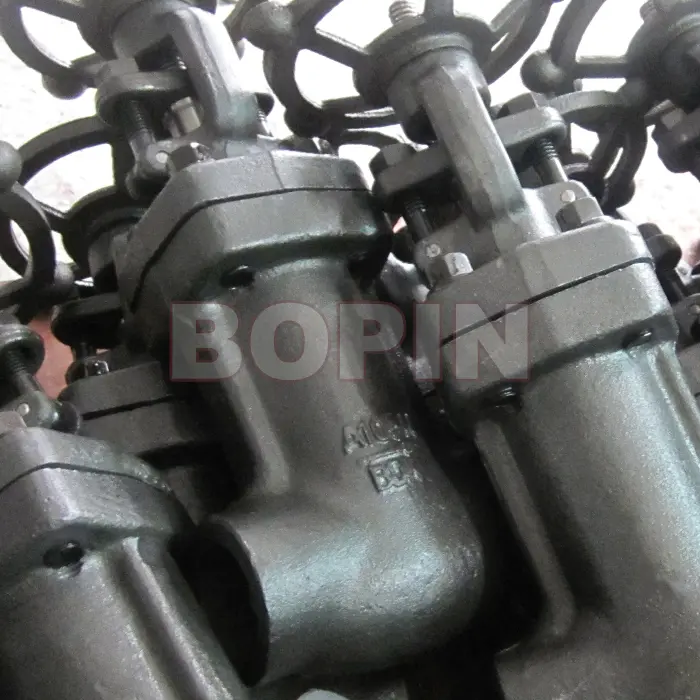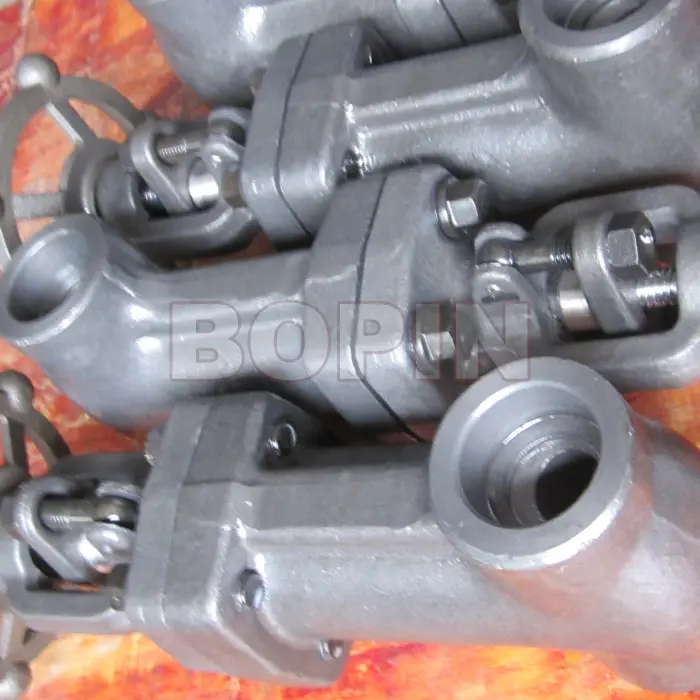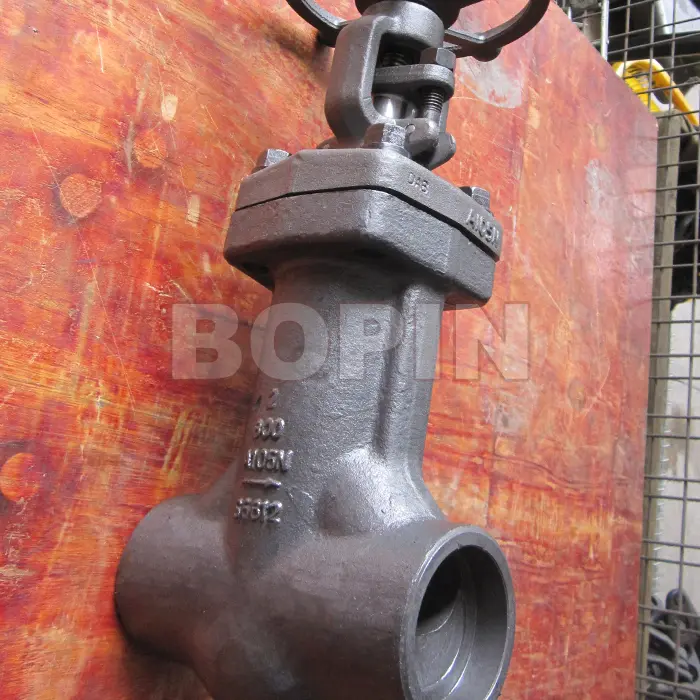0102030405
Forged Steel Bellows Sealed Globe Valve
Types of Bellows Sealed Globe Valve
The main materials typically used for the body, bellows, and other components of the valve include:
1. Carbon Steel (CS) GS-C25 or Forged Steel Bellows Globe Valves
Application: Commonly used for general-purpose applications in water, air, and gas systems.
Features: Strong and cost-effective, carbon steel is good for moderate pressure and temperature ranges.
Material Types: ASTM A216 WCB, ASTM A105.
2. Stainless Steel (SS) Bellows Globe Valves
Application: Suitable for industries requiring corrosion resistance, such as chemical, petrochemical, food, and pharmaceutical applications.
Features: Offers excellent resistance to corrosion and high-temperature capabilities.
Material Types: 304, 316, 316L stainless steel.
3. Alloy Steel Bellows Globe Valves
Application: Used in high-temperature and high-pressure systems or applications where higher strength and wear resistance are required.
Features: Superior mechanical properties, resistance to corrosion, and thermal stability.
Material Types: ASTM A182 F11, F22, F91.
4. Bronze and Brass Bellows Globe Valves
Application: Typically used in lower-pressure applications, such as in heating systems, plumbing, and water distribution.
Features: Excellent resistance to corrosion, especially in water systems, but not suitable for high-pressure or high-temperature applications.
Material Types: ASTM B62 (bronze), ASTM B16 (brass).
5. Cast Iron Bellows Globe Valves
Application: Used in non-critical applications such as water distribution and wastewater systems.
Features: Cost-effective but limited in terms of strength and temperature range.
Material Types: ASTM A126 Class B, ASTM A48.
6. Duplex and Super Duplex Stainless Steel Bellows Globe Valves
Application: Used in harsh environments where both corrosion resistance and high strength are required, such as in marine, offshore, and chemical processing industries.
Features: These materials have excellent strength, toughness, and resistance to chloride stress corrosion cracking.
Material Types: UNS S31803 (Duplex), UNS S32750 (Super Duplex).
7. Nickel Alloys Bellows Globe Valves
Application: High-performance applications in extreme conditions like high-pressure, high-temperature, and corrosive environments.
Features: Excellent resistance to high-temperature oxidation, corrosion, and stress corrosion cracking.
Material Types: Inconel, Monel, Hastelloy.
8. Titanium Bellows Globe Valves
Application: Ideal for very corrosive environments such as in the chemical, pharmaceutical, or marine industries.
Features: Titanium offers excellent corrosion resistance in aggressive environments but is more expensive.
Material Types: ASTM B265 Grade 2, Grade 5.
Each material offers different advantages depending on the operating conditions, such as temperature, pressure, and the type of fluid being controlled. The bellows component, in particular, is often made of materials such as stainless steel, Inconel, or Hastelloy to withstand the pressure and provide a leak-tight seal.
Why Choose
Forged steel is often used to make bellows-sealed valves due to its superior mechanical properties, which make it ideal for demanding applications. Here are the key reasons why forged steel is chosen for bellows-sealed valves:
1. Superior Strength and Durability
Forging Process: The forging process aligns the grain structure of the metal, enhancing its strength, toughness, and resistance to impact. This makes forged steel more durable than cast steel or other materials.
High Pressure and Temperature: Forged steel valves can handle high-pressure and high-temperature conditions better than cast materials, making them suitable for critical applications in industries such as oil and gas, power generation, and petrochemical.
2. Leak-tightness
Bellows Design: In a bellows-sealed valve, the bellows are responsible for preventing leaks along the stem, which is a critical function in many applications, especially where leakage can cause safety, environmental, or operational issues.
Forged Steel's Reliability: Forged steel is known for its reliability in sealing applications. It provides the necessary structural integrity to ensure that the bellows, which are subjected to high mechanical stresses, maintain a tight seal over time without deforming or leaking.
3. Corrosion Resistance
Forged Steel Alloys: Depending on the alloy chosen, forged steel can offer a range of corrosion resistance. For example, stainless steel (a type of forged steel) is highly resistant to corrosion, making it suitable for applications in corrosive environments (e.g., chemicals, seawater).
Bellows Material: Forged steel bellows can also be combined with corrosion-resistant materials such as Inconel or Hastelloy for extreme environments, providing a long service life even in harsh conditions.
4. Improved Fatigue Resistance
Fatigue Resistance: Bellows in valves undergo cyclical motion, which can lead to fatigue over time. Forged steel offers better fatigue resistance than cast steel or other materials, which is important in ensuring that the bellows last for many cycles without cracking or failing.
Longer Operational Life: The improved fatigue resistance of forged steel ensures that the bellows-sealed valve maintains its functionality for a longer period, reducing the need for frequent replacements.
5. Precision and Consistency
Uniform Properties: Forged steel has a more uniform microstructure compared to cast materials, which can result in more consistent performance and better overall quality. This is particularly important for components like bellows that need precise and reliable operation to ensure leak-tight performance.
Minimized Defects: The forging process minimizes internal defects, such as porosity or air pockets, which are more common in cast materials. This results in a stronger, more reliable valve body.
6. Size and Customization
Ability to Create Complex Shapes: Forging allows for the creation of complex shapes with better precision compared to casting. This means that forged steel can be used to create bellows-sealed valves with a range of sizes, shapes, and designs that meet specific application requirements.
Tailored to Specific Needs: Forged steel valves can be customized to meet specific requirements for flow, pressure, temperature, and leakage control, making them ideal for high-performance applications.
7. Resilience to Extreme Conditions
Thermal Shock Resistance: Forged steel is more resistant to thermal shock than cast materials, meaning it can withstand rapid changes in temperature without cracking or losing structural integrity. This is especially important in processes where temperature fluctuations are common.
High Impact Resistance: Forged steel valves are more resistant to physical impact and mechanical stress, which enhances their suitability for challenging environments where equipment might be subjected to mechanical forces.
8. Cost-Effectiveness in Long-Term Use
Lower Maintenance: The durability and reliability of forged steel bellows-sealed valves often result in lower maintenance costs over time, as they are less likely to need repairs or replacements.
Longer Service Life: While forged steel valves may have a higher upfront cost than cast alternatives, their long service life and reduced likelihood of failure can make them more cost-effective in the long term.
Applications
Bellows-sealed globe valves are widely used in industries where leakage prevention, precise control, and reliable performance are critical. The bellows provide a robust, leak-tight seal that isolates the stem from the medium being controlled, preventing leakage along the valve stem. Here are the primary applications of bellows-sealed globe valves:
1. Cryogenic Applications
Description: Bellows-sealed globe valves are commonly used in cryogenic applications, where extremely low temperatures are involved (such as liquefied natural gas (LNG) systems or cryogenic storage tanks).
Reason: The bellows seal helps prevent leakage at extremely low temperatures, ensuring the valve remains effective even in environments where materials can become brittle or contract.
2. High-Pressure Systems
Description: These valves are ideal for high-pressure systems in industries such as oil and gas, petrochemical, and power generation.
Reason: The bellows ensure that the valve stem remains sealed and leak-free under high-pressure conditions, preventing fluid or gas from escaping along the stem and reducing the risk of accidents.
3. Nuclear Power Plants
Description: Bellows-sealed globe valves are used in critical applications in nuclear power plants, such as cooling and steam systems.
Reason: The bellows design prevents leakage of radioactive fluids, offering an additional layer of safety in sensitive environments where maintaining a sealed system is essential for both safety and operational efficiency.
4. Chemical and Pharmaceutical Industry
Description: Used in applications where hazardous, corrosive, or toxic chemicals are handled, including pharmaceutical manufacturing and chemical processing.
Reason: The bellows-sealed design ensures that aggressive chemicals do not leak along the valve stem, which could otherwise pose a safety risk, environmental hazard, or contamination concern. The bellows can also be made from materials like Hastelloy or Inconel for better corrosion resistance.
5. Power Generation
Description: In steam and water systems within power plants, bellows-sealed globe valves are used for controlling fluid flow and isolating sections of the system.
Reason: These valves are designed to maintain tight seals, ensuring that steam, water, and other fluids remain contained under high pressure and temperature conditions, thus improving operational efficiency and safety.
6. Gas Distribution Systems
Description: Bellows-sealed globe valves are employed in gas distribution and transmission systems, including natural gas and compressed air pipelines.
Reason: The bellows seal prevents the leakage of gases, which could be dangerous in terms of both safety (explosions or fire) and environmental impact. It also ensures the integrity of the system under fluctuating pressure conditions.
7. Hydraulic and Pneumatic Systems
Description: Used in hydraulic and pneumatic applications, such as in machine control and fluid power systems.
Reason: In these systems, maintaining a tight seal is crucial to prevent fluid loss or contamination. The bellows-sealed valve helps to ensure that the operating fluid does not leak, ensuring system efficiency and performance.
8. Water and Wastewater Treatment
Description: Bellows-sealed globe valves are often used in water treatment plants, wastewater treatment facilities, and desalination plants.
Reason: These valves prevent leaks that could affect water quality or system performance, ensuring smooth operation without the risk of contamination or leakage, especially when dealing with high-pressure or corrosive water streams.
9. Food and Beverage Industry
Description: In food processing, bellows-sealed globe valves are used for applications such as controlling steam, water, or gas flow.
Reason: The bellows design ensures hygienic, leak-free operation, preventing contamination of the food or beverage with process chemicals or other substances that could affect product quality and safety.
10. Offshore and Marine Applications
Description: In offshore oil platforms or marine vessels, bellows-sealed globe valves are used for fluid control in systems exposed to harsh environmental conditions.
Reason: These valves help maintain leak-tight operation even under the extreme pressures, temperatures, and corrosive conditions found in offshore and marine environments, ensuring safety and preventing environmental contamination.
11. High-Temperature Applications
Description: Bellows-sealed globe valves are commonly used in high-temperature applications, such as steam systems, heat exchangers, and industrial furnaces.
Reason: The bellows design helps to prevent leakage of steam or hot fluids, which could cause damage, accidents, or loss of efficiency. The material selection (such as Inconel or stainless steel) provides the necessary resistance to high temperatures.
12. Vacuum Systems
Description: These valves are used in vacuum systems, such as those in laboratories, semiconductor manufacturing, and vacuum pumps.
Reason: In vacuum systems, maintaining a tight seal is crucial to prevent the loss of vacuum. Bellows-sealed globe valves ensure a reliable and leak-free operation, even at very low pressures.
13. Severe Service Conditions
Description: Used in industries where the flow media is highly abrasive, erosive, or contains solids (e.g., mining, cement, or paper mills).
Reason: The bellows-sealed design ensures that no abrasive or aggressive media can escape through the valve stem, helping to protect the valve internals and minimize wear and tear while maintaining system integrity.
Key Advantages for Applications:
Leak Prevention: The most notable feature of bellows-sealed globe valves is their ability to prevent leakage along the valve stem, making them ideal for hazardous or sensitive applications.
Extended Service Life: Bellows help to absorb movement, which reduces wear and extends the life of the valve in high-pressure or high-temperature systems.
Maintenance Reduction: By preventing leaks, these valves reduce the need for frequent maintenance, which can be costly and time-consuming, especially in critical or hard-to-access systems.
Production Range
The production range of forged steel bellow sealed globe valves typically refers to the valve sizes, pressure ratings, and materials available for manufacturing. Forged steel globe valves are produced in a wide range of specifications to meet the requirements of different industrial applications. Below is an overview of the common production ranges for forged steel globe valves:
1. Valve Sizes (Diameter)
● Small Size Valves: Typically from 1/2 inch (15 mm) to 2 inches (50 mm). These are commonly used for controlling small flow rates or in more compact systems.
● Medium Size Valves: From 2 inches (50 mm) to 6 inches (150 mm). These are standard sizes for most industrial applications.
● Large Size Valves: Ranging from 8 inches (200 mm) to 24 inches (600 mm). These larger valves are used in high-flow applications, such as in pipeline systems for oil, gas, or water.
● Extra-Large Sizes: In some cases, valves up to 36 inches (900 mm) or more can be manufactured for special applications, though these are less common.
2. Pressure Ratings (Class Ratings)
Forged steel globe valves come in various pressure classes that correspond to the maximum allowable pressure the valve can withstand. Common pressure ratings include:
● Class 150: This corresponds to a pressure rating of up to 285 psi (20 bar) at room temperature. Common in low-pressure applications.
● Class 300: Pressure rating up to 740 psi (51 bar) at room temperature. Suitable for medium-pressure applications.
● Class 600: Pressure rating up to 1480 psi (102 bar) at room temperature. Often used for high-pressure applications, such as in steam, water, and gas systems.
● Class 900: Pressure rating up to 2220 psi (153 bar) at room temperature. Typically used in more demanding industrial systems.
Note: Pressure ratings can vary depending on the material used and the design, and they will also depend on the temperature of the medium (since pressure ratings change with temperature).
3. Temperature Range
● Low-Temperature Applications: Forged steel globe valves are available in low-temperature versions that can operate in temperatures as low as -196°C (-320°F) (cryogenic applications).
● High-Temperature Applications: They can also be designed for high-temperature service, with materials rated for temperatures up to 650°C to 750°C (1202°F to 1382°F), depending on the alloy (e.g., using Inconel or other heat-resistant materials).
● Standard Temperature Range: Most forged steel globe valves operate effectively in the standard range of -29°C (-20°F) to 200°C (392°F).
4. Design Configurations
● Standard Globe Valve: The most common design with a linear flow path for throttling or on/off control.
● Y-Pattern Globe Valve: Designed to reduce pressure drop by aligning the flow path in a "Y" shape, which is ideal for systems with higher flow rates.
● Angle Pattern Globe Valve: This configuration provides a right-angle flow path, which can be used for applications where space or installation considerations are important.
5. End Connections
● Flanged Ends: Common for larger valves, typically in sizes 2 inches (50 mm) and above, conforming to standards like ANSI, ASME, or API.
● Threaded Ends: Typically used for small-size valves, generally up to 2 inches (50 mm). These are threaded to fit pipes.
● Butt Weld Ends: Used when a more permanent connection is needed, such as in high-pressure or high-temperature systems.
● Socket Weld Ends: Used for small-diameter pipes in systems with high-pressure applications.
6. Valve Actuation
● Manual: For standard on/off or throttling applications where manual operation is sufficient.
● Pneumatic or Electric Actuators: Used for remote or automated control of the valve, commonly found in large-scale industrial applications.
● Hydraulic Actuators: Used in high-force, high-speed applications, such as offshore or heavy-duty industrial systems.
Forged steel globe valves are produced in a wide range of sizes, pressure ratings, and materials to meet the demands of various industries, from general-purpose applications to extreme service conditions. The combination of high strength, durability, and customization options makes forged steel valves essential for critical systems where reliability and leak-tight performance are required.




















